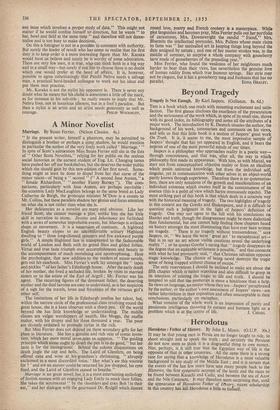Herodotus
Herodotus : Father of History. By John L. Myers. (O.U.P. 30s.) IT may be that young men in Persia are no longer taught to ride, to shoot straight and to speak the truth ; and certainly the Persians i do not now seem to think it is a disgraceful thing to owe money. Nor, perhaps, is it still true that the Egyptian way of life is the opposite of that in other countries. All the same there is a strong case for saying that a knowledge of Herodotus is a most valuable background to any study of the Middle East ; and it is certain that the events of the last few years have sent many people back to the Histories, the first systematic account of the lands and the races to be found between Karachi and Cadiz, and between the sea of Azov and the Nile Cataracts. It may therefore seem surprising that, until the appearance of Herodotus Father of lit:gory, recent scholarship in this country has left Herodotus a little to himself. The central theme of Sir John Myres' book is the system followed by Herodotus in arranging his material. The view that Herodotus was an unreliable gossip-monger has long since been discarded. The view that he was at any rate wildly discursive has persisted. This latter opinion Sir John disposes of neatly by pointing out that many of the allegedly discursive passages would in a modem work have been relegated to footnotes and appendices for which the literary apparatus of the fifth century B.C. did not provide. On the contrary, he puts forward the theory that the whole work is most carefully written according to an . intricate principle to which he gives the name'' pedimental composition." To follow this principle, the writer must arrange the episodes he wishes to recount on either side of a central climax, instead of proceeding from event to event in chronological order. Sir John examines its application by Herodotus and finds that the Histories do in fact consist of a series of such central climaxes or triptyches, observing that the " pedi- mental structure " of the book has eluded literary critics probably because the literary skill of Herodotus " has so completely united the substance of history with its form."
There is a good deal more in the way of comment on Herodotus which is as fresh and as fascinating as any of Sir John's lectures at Oxford. He has found passages in which iambic rhythm is frequent ; there is an interesting section on the philosophy of Herodotus, a most valuable chapter on the critics of Herodotus, and an illuminating note on map making in the fifth century. About half the book is given up to the discussion of some of the principal topics of the Histories such as early Lydia, the history of Samos, and the battles of the Persian war, illustrated by plans based on those of the Greek- general staff. After a lifetime given up to Ancient History and the study of the classical background on the spot (to say nothing of his experiences in one of H.M. ships during World War I), nobody could be better equipped than Sir John to give us the definitive commentary on Herodotus. If we are not to get this from him, Herodotus Father of History is certainly the next best thing.
BICKHAM SW EET-ESCOTT.



































 Previous page
Previous page